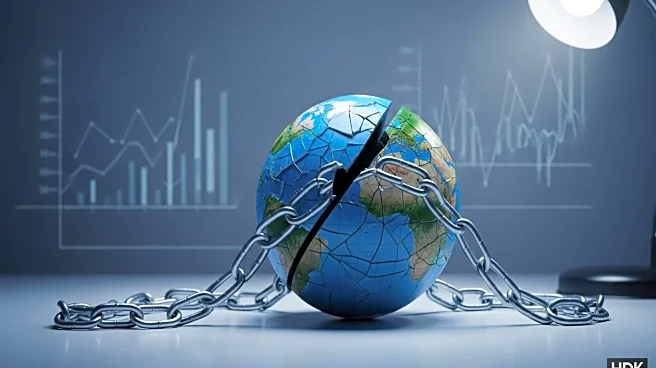What's Happening?
The ongoing immigration crackdown by Immigration and Customs Enforcement (ICE) is causing significant disruptions for businesses across the United States. Despite the government shutdown, ICE operations continue as an 'essential' service, leading to deportations and increased scrutiny of foreign workers. CEOs from various industries have reported negative impacts, including reduced customer numbers and decreased productivity. For instance, travel operators and manufacturers have seen a decline in sales, particularly in southern states, due to concerns over immigration policies. Additionally, foreign companies like South Korea's LG have restricted business travel to the U.S. following detentions of workers on temporary visas. The number of international students entering the U.S. has also dropped significantly, affecting spending and economic contributions. Companies are facing delays and productivity losses due to ICE status checks, and there is a growing fear among foreign-born workers and customers about potential disruptions to their legal status and financial access.
Why It's Important?
The immigration crackdown has broader implications for the U.S. economy and business environment. Industries reliant on foreign labor, such as agriculture, are facing worker shortages that could lead to food scarcity and increased prices. The fear and uncertainty among foreign workers and customers can lead to decreased economic activity and hinder business operations. The crackdown may also deter international talent and investment, impacting innovation and competitiveness. While some argue that ICE raids could create jobs for American workers, the immediate disruption is causing economic harm and affecting business confidence. The situation highlights the tension between immigration policies and economic needs, with potential long-term consequences for U.S. industries and international relations.
What's Next?
Businesses and industry leaders may seek to engage with policymakers to address the negative impacts of the immigration crackdown. There could be calls for more balanced immigration policies that support economic growth while ensuring national security. Companies might also explore strategies to mitigate the effects of reduced foreign labor, such as investing in automation or seeking alternative markets. The ongoing situation may prompt discussions on the role of immigration in the U.S. economy and the need for comprehensive reform. Stakeholders, including business associations and advocacy groups, are likely to continue monitoring developments and advocating for policies that align with economic interests.
Beyond the Headlines
The immigration crackdown raises ethical and legal questions about the treatment of foreign workers and the balance between security and economic prosperity. It also reflects broader cultural and political debates about immigration in the U.S. The situation could influence public opinion and policy discussions, potentially leading to shifts in immigration laws and enforcement practices. Long-term, the crackdown may affect the U.S.'s reputation as a destination for international talent and investment, impacting its global standing and economic competitiveness.











